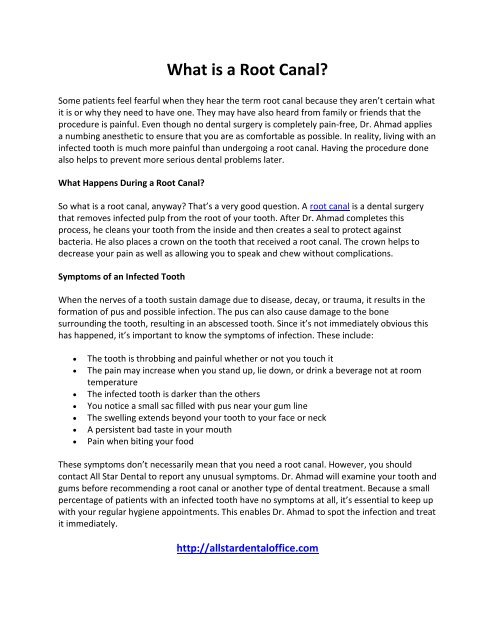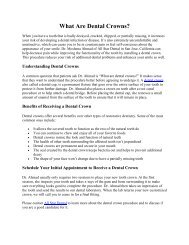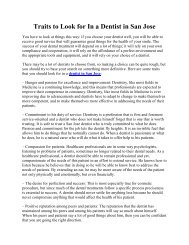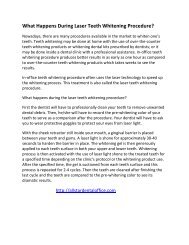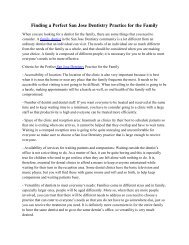What is a Root Canal?
Root Canal treatment is often misunderstood and unilaterally seen as painful, but this is an essential treatment for tooth decay. To know more about this treatment, visit http://allstardentaloffice.com/what-is-a-root-canal
Root Canal treatment is often misunderstood and unilaterally seen as painful, but this is an essential treatment for tooth decay. To know more about this treatment, visit http://allstardentaloffice.com/what-is-a-root-canal
You also want an ePaper? Increase the reach of your titles
YUMPU automatically turns print PDFs into web optimized ePapers that Google loves.
<strong>What</strong> <strong>is</strong> a <strong>Root</strong> <strong>Canal</strong>?<br />
Some patients feel fearful when they hear the term root canal because they aren’t certain what<br />
it <strong>is</strong> or why they need to have one. They may have also heard from family or friends that the<br />
procedure <strong>is</strong> painful. Even though no dental surgery <strong>is</strong> completely pain-free, Dr. Ahmad applies<br />
a numbing anesthetic to ensure that you are as comfortable as possible. In reality, living with an<br />
infected tooth <strong>is</strong> much more painful than undergoing a root canal. Having the procedure done<br />
also helps to prevent more serious dental problems later.<br />
<strong>What</strong> Happens During a <strong>Root</strong> <strong>Canal</strong>?<br />
So what <strong>is</strong> a root canal, anyway? That’s a very good question. A root canal <strong>is</strong> a dental surgery<br />
that removes infected pulp from the root of your tooth. After Dr. Ahmad completes th<strong>is</strong><br />
process, he cleans your tooth from the inside and then creates a seal to protect against<br />
bacteria. He also places a crown on the tooth that received a root canal. The crown helps to<br />
decrease your pain as well as allowing you to speak and chew without complications.<br />
Symptoms of an Infected Tooth<br />
When the nerves of a tooth sustain damage due to d<strong>is</strong>ease, decay, or trauma, it results in the<br />
formation of pus and possible infection. The pus can also cause damage to the bone<br />
surrounding the tooth, resulting in an abscessed tooth. Since it’s not immediately obvious th<strong>is</strong><br />
has happened, it’s important to know the symptoms of infection. These include:<br />
<br />
<br />
<br />
<br />
<br />
<br />
<br />
The tooth <strong>is</strong> throbbing and painful whether or not you touch it<br />
The pain may increase when you stand up, lie down, or drink a beverage not at room<br />
temperature<br />
The infected tooth <strong>is</strong> darker than the others<br />
You notice a small sac filled with pus near your gum line<br />
The swelling extends beyond your tooth to your face or neck<br />
A pers<strong>is</strong>tent bad taste in your mouth<br />
Pain when biting your food<br />
These symptoms don’t necessarily mean that you need a root canal. However, you should<br />
contact All Star Dental to report any unusual symptoms. Dr. Ahmad will examine your tooth and<br />
gums before recommending a root canal or another type of dental treatment. Because a small<br />
percentage of patients with an infected tooth have no symptoms at all, it’s essential to keep up<br />
with your regular hygiene appointments. Th<strong>is</strong> enables Dr. Ahmad to spot the infection and treat<br />
it immediately.<br />
http://allstardentaloffice.com


